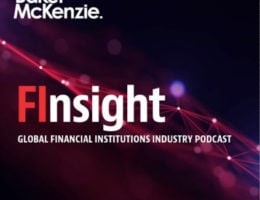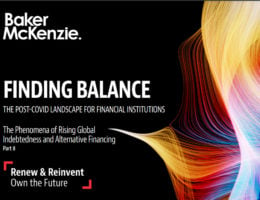The Economic Crime and Corporate Transparency Act 2023 received Royal Assent on 26 October 2023. The Act is a landmark development in the UK Government’s long-standing efforts to enhance the UK’s economic crime enforcement framework, and the Act introduces a number of important measures designed to improve corporate transparency and tackle economic crime in the UK
and abroad.
In the latest episode of Baker McKenzie’s global financial institutions industry podcast, Jonathan Peddie and Amy Greer go through the findings relevant for financial institutions from Baker McKenzie’s report The Year Ahead: Global Disputes Forecast 2023. The episode examines the expected types of disputes and the external risks for disputes throughout the rest of the year.
Financial institutions are critical players in the transition to a carbon-neutral economy and, because of their role in allocating capital, they can act as a catalyst in achieving better environmental, social and governance outcomes in society generally. Baker McKenzie’s updated Sustainability Risk Radar analyzes the most pressing sustainability risks that FIs need to consider in 2023.
The business models of financial institutions are changing: how services are delivered, the ways in which they can earn revenue and the search for new ways to monetize value. COVID-19 has accelerated the take-up of digital transformation due to the need to conduct more business remotely through digital channels. Simultaneously, customers have shown a greater willingness to use technologies in which previously they may have lacked confidence.
Read our ninth installment focused on the impact of new technology on financial institutions.
On 26 November 2021, the FCA published Policy Statement 21/16 “Issuing statutory notices — a new approach to decision-makers” (“PS21/16”). In PS21/16, the FCA sets out the final changes to the Decisions Procedure and Penalties Manual and the Enforcement Guide as proposed in the Consultation Paper (CP21/25) published in July 2021. This transfers decision-making from the Regulatory Decisions Committee to the FCA in certain authorisation, intervention and straightforward cancellation cases and in respect of decisions on whether to commence civil and criminal proceedings from 26 November 2021.
Episode 21: COP26 Key Takeaways for Sovereign Wealth Funds
In this episode of FInsight, Andrew Hedges and Kay She from Baker McKenzie’s EMI group in London discuss their experience and observations while on the ground in Glasgow. They cover business imperatives and challenges affecting the global economy and how sovereign wealth funds are well-positioned to influence and make an impact on broader sustainability goals and action plans. As discussions on climate-related issues evolve from commitments to execution in the recent COP26 UN Climate Change Conference, we unpack some of the key takeaways relevant for sovereign wealth funds.
The risks arising from unsustainable indebtedness to which both traditional and alternative financing sectors have exposure are higher in emerging economies, where the debt burden is much more elevated generally and whose borrowers are more susceptible to default if (as is expected), US dollar interest rates rise. Emerging economies with less policy intervention, monitoring and regulation are more vulnerable than advanced economies. This eighth installment focuses on the phenomena of rising global indebtedness and alternative financing.
In this episode of FInsight, Baker McKenzie partners Daniela Fonseca Puggina from our Miami office and Jennifer Semko from our Washington D.C. office discuss litigation readiness for FIs. The episode also covers potential vulnerabilities and disputes that they need to prepare for, current and emerging trends in litigation (from our Litigation Intelligence Tool and Report), and how they can benefit from litigation preparedness.
In the latest episode of the Global Financial Industry Podcast, Baker McKenzie associates discuss: Sovereigns series – key principles of investment treaty protection. The episode covers recent examples of sovereign wealth fundsSWFs bringing investment treaty claims and how others can obtain access to these protections. The episode also analyzes why investors should consider investment treaties as part of their decision-making process.
COVID-19 represents one of the greatest ever shocks to our economies and, in consequence, to the business models of financial institutions and the way they do business. While many changes to business processes and operations were already taking place prior to the pandemic, COVID-19 has given many added impetus and urgency. Decision-makers must choose between adapting a wait-and-see approach or implementing more proactive strategies to safeguard and, if possible, grow their businesses.









